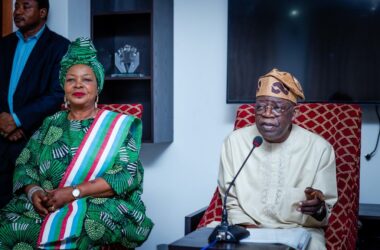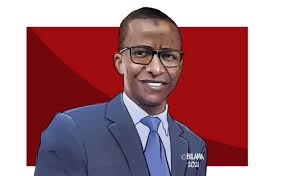Globacom Celebrates Two Decades of Redefining the Nigerian Telecom Industry
‘ Glo with Pride!’
That was the payoff (and rallying cry) of Nigeria’s first and foremost indigenous mobile telecommunications company as it made its triumphant entry into the country’s fledgling telecoms market two decades ago. It was a payoff that not only appealed to the innate spirit of the Nigerian person and his grudging but no less potent sense of patriotism, but also loudly reinforced the notion that there is nothing too hard for a Nigerian (whether male or female, old or young) to do if they put their minds to it.
20 years on from that momentous beginning, Globacom Telecommunications Company Limited is still blazing new trails and expanding new frontiers every day, for the benefit of an ever-expanding customer and client base. Today, thanks to Globacom, millions of Nigerians and citizens of some sister-states in the West African sub-region are not only Glo-ing with Pride, they are using its many platforms, products and offerings to Rule their World – and in the process discovering Unlimited possibilities in their business, career, educational, health and wellness, and relationship journeys. Yes, the payoffs may have changed over the years, but the pioneering spirit and hunger for innovation that animated Globacom’s early beginnings has not abated one bit.
In the great cycle of time, 20 years might seem like a short period, an infinitesimal drop of water in the cosmic sea. But in the life of an individual or corporate entity, 20 years is a long time indeed – especially if those years have been nothing short of eventful, and marked by tremendous growth in both the quantity and quality of its goods and services, as well as in market share, industry leadership and engagement with both its internal and external systems. In its two decades of operation, Globacom has grown into a globally recognised corporate juggernaut and an undisputable pacesetter in its industry, thanks to a business model that stresses excellence, constant innovation and customer satisfaction above all else.
The period between August 2003 and August 2023 can rightfully be described as a watershed period in the Nigerian telecommunications industry. Infact, one can go so far as to assert that Globacom is the catalyst that revolutionised the mobile telecommunications ecosystem in the country, and placed her entire economy on the pedestal it is on today, as well as positioning it for greater growth in a future in which new work and social paradigms and cutting-edge technologies will define the way we work, live and interact with one another.
The brainchild of the billionaire business tycoon, Dr. Mike Adenuga, Jr, GCON, Globacom is a reflection of its Chairman’s far-sighted vision and single-minded determination to see that vision come to pass. Adenuga’s penchant for innovation, attention to detail, hunger for success, and the ability and willingness to take calculated risks with an eye towards eye-popping rewards is writ large in the profile and fortunes of Globacom.
Globacom came into the Nigerian market at a most auspicious time indeed. Before the advent of GSM and mobile telephony, Nigeria as a country (with an estimated population of over 150 million people at the time) – had a paltry 400,000 active phone lines (landlines, they are called), meaning that less than one percent of the country’s citizens had access to telephony services.
The now-defunct NITEL (Nigerian Telecommunications Limited) reigned supreme as the king of the digital jungle with a monopolistic grip. Riddled with gross and embarrassing inefficiencies, NITEL in time became a cesspit of corruption and insensas well. Protests from its frustrated and beleaguered customers, and calls for improved services, were answered with an official attitude that can be best summarised by a remark allegedly made by a one-time Minister for Communications: “Telephones are not for the poor.”
When GSM first cast its anchor on our shores in 2001 (with the arrival of the first two legacy mobile operators) Nigerians beleved their prayers had at last been answered. The new telecoms regime was rightly seen as a clear departure from the egregious failure of the state-owned monopoly that had gulped so much public expenditure in the form of subventions and taxes without a commensurate return in services.
However, the euphoria of the coming of GSM services soon gave way to bewilderment. Doubt quickly replaced hope, as Nigerians were confronted with the reality or shall we say, double jeopardy – of both the high cost of mobile lines AND the N50 per minute billing system. In a more subtle replication of the “Telephones are not for the poor” attitude, the legacy mobile operators insisted that it was ‘impossible‘ to sell lines at more affordable prices. Not only that, they also ruled out per-second billing (PSB) as being unrealistic, owing to the cost of obtaining licences and the humongous funds needed for network expansion. One of the networks even condescended to say that per second billing could only happen in 2010!
So, GSM services, like those of NITEL, seemed destined to remain the exclusive preserve of Nigeria’s rich and middle class for the foreseeable future.
But then … Globacom came along! Like a corporate knight in shining armour, came a man on the scene for whom the word ‘impossible’ was … nothing. There came a man who was ready to do in 2003 – seven years early – what they had said could only be done in 2010.
It was, needless to say, a seismic shift. Apart from breaking the duopoly of the two legacy operators, the arrival of Globacom – like Alexander the Great of old cutting the proverbial Gordian knot – undid the duo’s oligopolistic hold on the secto and changed its dynamic, with the introduction of cheaper mobile lines and (more importantly), per-second billing. And what looked like yet another status symbol in a society already notorious for its stark inequalities and the status-consciousness of its rich and not-so-rich alike, became affordable to Nigerians irrespective of their station in life.
Overnight, permutations were altered. Hegemony gave way to intense competition, and massive investments were made in telecoms infrastructure as each network feverishly honed its marketing strategies in the sudden scramble for new subscribers.
In less than two decades, Nigeria’s active phone lines skyrocketed from the said 400,000 in 2001 to over 200 million as at April 2023. Internet access rose from less than 1% broadband penetration in 2001 to 48% (which traslates to 157 million subscribers). And while other mobile operators cumulatively lost about 100,000 internet subscriptions in one month, according to the industry regulator, Globacom gained over 200,000 subscriptions in the same period.
This giant leap – and the comparative advantage Globacom enjoys over the competition – is not by chance, far from it. The network’s phenomenal growth has been undergirded by its willingness to consistently invest in and deploy cutting-edge technology in the markets where it operates, thus ensuring that its subscribers benefit from the advances made in telecommunications and information technology for personal, social and business prosperity. For example, Globacom was the only operator in all of Africa to launch its operations on the superior 2.5G network which enabled the convergence of voice, data and multimedia technologies – an innovative platform that not only ensured unparalleled voice clarity and low drop calls, but also enabled the offering of value-added services previously unavailable on the 2G technology – such as vehicle tracking, mobile internet, mobile banking, multimedia messaging service (MMS), voice SMS, Magic Plus and Text2email.
Another leap for Globacom, which firmly established the network as the undisputed pacesetter in the industry was the introduction, amid fanfare, of the 3G Plus technology – an event that marked the second time that Globacom would be at the forefront of birthing the latest transmission network in Nigeria. This new technology enabled a much faster transmission of data, voice, broadband internet and multimedia services over a range of frequencies, and it allowed customers to make video calls, video streaming and high-speed mobile internet access, amongst others, just from their 3G mobile handsets.
Globacom also became the first network in the country to test the 4G-LTE network, a revolutionary fourth-generation mobile technology, that enhances data transfer rates, delivers unmatched mobile broadband experience and the highest data speeds and reliability, thus putting Nigeria in the league of nations where long-term evolution (LTE) has continued to gain traction.
Glo’s commitment to relentless network expansion, in terms of both quality and quantity, so as to give its customers top-notch service, is squarely in line with the company’s mission statement: “To be the largest, most successful entertainment, information and telecommunications solutions provider, in Nigeria and Africa”. And in the last 20 years, it has has invested billions of dollars in extending its long reach to ever more nooks and crannies of Nigeria and beyond – most notably via the deployment of the most extensive fibre optic backbone across the country. The fibre optic cable was built to further enhance voice and data transmission for mobile and fixed telephone operations in the country, and is complemented by a microwave backbone that serves as backup. The cable helps ensure that calls on the network are crisp and clear, without the interference of breaks and drops.
As it is above-ground, so also below ground and even undersea. Globacom’s game-changing innovations took another leap forward – especially in the area of broadband connectivity – with the launch of Glo-1, the humongous intercontinental submarine cable linking Nigeria with the outside world. Costing over $250 million dollars, this project marked the first time a single company in Africa would implement such a massive undersea project. Glo-1 is an expansive trans-Atlantic cable designed to provide internet connectivity between Europe, America and the West African coast. The 9,800 km-long cable has landing points in Lagos, Accra (Ghana), Dakar (Senegal), Nouakchott (Mauritania), Casablanca (Morocco), Vigo (Spain), Bude (England), among other points. Glo-1 delivers a much faster and robust connectivity for voice, data and video. In addition to boosting the provision of services to telecom end-users, the facility is currently providing much-needed connectivity to critical sectors of the Nigerian and international economies such as oil and gas, manufacturing, banking, commerce, education and health, among others.
Today, like an ever-widening concentric circle, the impact of the telecom revolution brought about by Dr. Mike Adenuga’s bold move at the beginning of this millennium has resonated well beyond the telecoms sector and impacted other critical sectors of the Nigerian economy in no small way. The list of Globacom’s interventions in this regard are simply too many to enumerate in this piece.
Outside of the critical sectors of the economy, cultural heritage, arts, entertainment and sports have been particularly fortunate beneficiaries of Globacom’s sponsorship largesse. Partly in recognition of its Corporate Social Responsibility (CSR) obligations, partly due to its understanding of its enlightened self-interest in improving the human development indices of its catchment areas as a way of creating a sustainable environment in which to do business, and to a large extent a tangible proof of the philanthropic impulses of its Chairman, Dr. Adenuga, Globacom has spent untold fortunes on these areas of human endeavour.
From the iconic and eagerly anticipated events which light up the nation’s cultural calendar, such as the Ojude Oba Festival and the Onitsha Ofala Festival (to name just two) to the numerous talent, reality and game shows that have produced stars who have gone on to become global icons in music, movies, comedy and so forth, Globacom’s sponsorship footprint is everywhere, and its logo is a conspicuous and familiar sight. Nigeria’s ascendancy on the world stage as an emerging cultural superpower has GLOBACOM wrotten all over it. Not long ago, for example, Globacom launched an online streaming app. Known as GloTV, it is an innovative TV streaming service on Android, IoS and Web for watching live TV; video on demand; and Catch-up with premium content.
It is no secret that Nigeria’s quest to develop a functional, profitable and dynamic football league and general ecosystem capable of sustaining itself and becoming profitable enough to wean itself of its long-standing dependence on government subvensions has motivated Globacom, since its inception, to support Nigerian football in various ways – a support which culminated in the heartwarming triumph of Nigeria’s Super Eagles in the 2013 African Nations Cup (AFCON), among other feats. Globacom was, for many a season, the sole sponsor of the Glo/CAF Awards which honoured individual and team excellence from the continent.
As millions of Nigerians and other West Africans join Dr. Mike Adenuga Jr., GCON, and the management and staff of Globacom in marking the second decade of the company’s operations, and marvel at its successes in the face of the challenges inherent in doing business in Nigeria, they might also take a pause to imagine what might have been, had Globacom not happened on the scene when it did:
If not for Globacom, perhaps Nigerians might still be paying exorbitant amounts for mobile line connectivity.
If not for Globacom, perhaps Nigerians would still be under the stranglehold of the per-minute billing system.
If not for Globacom, perhaps the legacy operators would have maintained their hegemonic stance that per-second billing was ‘impossible.’
It is hard to imagine Nigeria’s telecoms sector without Globacom. Hard to imagine the creation of massive jobs in the economy today without Globacom. Hard to imagine the ease of doing business environment made possible by Globacom’s high connectivity technology. Today, thanks to Glo, Nigerians have laughingly consigned the infamous remark, ‘Telephones are not for the poor, ” where it belongs – in the trash bin of history.
It was the vision and audacity of one man – a man with a penchant for making the impossible possible, a man who dared to imagine the biggest and best telecommunications network in Africa – that has made all the difference.
After two momentous decades of redefining the standards and paradigms of the Nigerian telecommunications industry, it is probably not enough to say, “Congratulations, Globacom.” It will certainly not be out of place to say, “Thank you, Globacom, for coming to the rescue.”
And, yes, congratulations, too. Here’s to the next two decades.






